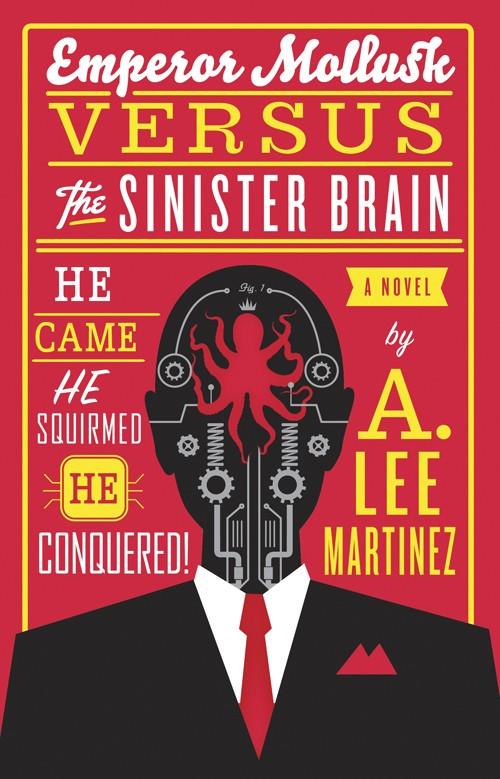“With great power comes great hilarity.” That’s a tagline on the book’s cover, but it could be the musings of the eponymous emperor in the book “Emperor Mollusk Versus the Sinister Brain,” by A. Lee Martinez.
Emperor Mollusk, a genius, squid-like Neptunon who resides in the heads of various robots, had it all. He conquered Terra, Martinez’s stand-in for Earth, and faced down myriad threats, from mutated bugs swarming Topeka to the feared Saturnite army. But irony upon irony, it’s all boring him.
He gives up his position as Supreme Warlord of Terra, and lives a life something like a beloved ex-president, only it involves saving the world from the occasional horror from beyond. His happy, quiet life, however, is soon interrupted.
After an attempted arrest by a Venusian army officer, an old “friend” of Mollusk’s named Zala, an assassination squad attempts to kill the emperor. His calculating brain and technological brawn save his skin, but the challenge of finding his killers’ employer proves too much for the ex-warlord. With Zala, intent on arresting a criminal wanted everywhere in the solar system, and his faithful and indestructible ultrapede Snarg in tow, Mollusk untangles the conspiracy and matches wits with a mysterious opponent, known only as … the Sinister Brain!
Even from a short review of the plot, it is clear that “Emperor Mollusk Versus the Sinister Brain” is pulpier than an orange. If the popularity of Quentin Tarantino is any indication, hard genre works with a certain amount of self-realization and can be interesting and marketable art. And this book has no pretensions about its identity.
Narrated in the first person, Emperor Mollusk’s thoughts often remark on the beautiful absurdity of the world that Martinez weaves. For example, do you want a hyper-capitalist Atlantis being attacked by a jelly monster? You got it. How about an Ancient Egyptian-style kingdom ruled by a 5,000-year-old queen? Yep. Dinosaur Island? Abso-got-dang-lutley, with a whole ecosystem of wonderfully ridiculous fictional dinosaurs to boot.
The whole thing has the flashy, glitzy wonderment of a movie montage when everyone first arrives in Vegas or Hollywood, and the author, narrator, and happily reader are all wryly aware of it.
Though its environments, characters and premises are merrily hurtling toward the hot center of madness, the tone of the book is actually fairly subdued. Emperor Mollusk is a typical super-genius, too intelligent for morality, sociability, or his own good. Zala, his bitter enemy and also the closest thing he has to a friend, is a warrior bound by honor and duty. Their conversations, though filled with witty repartee and Odd Couple-ishness, actually do a fair amount of humanizing of both characters.
Mollusk’s personality is not dissimilar to how you would picture a small evil squid in a robot’s head. His better qualities are revealed slowly as the book progresses. He’s not just a conqueror of worlds; he’s a conqueror who cares about the worlds he conquers. There is a genuinely poignant flashback to a terrible thing Mollusk did in his war against Saturn, in which we see the emperor’s reluctance to do bad and the way it goes on to haunt him.
These strengths all serve to highlight one of the unfortunate weaknesses of the book, its ending. The book slams to a halt as opposed to coasting into something satisfying. Instead of a real ending, it feels that the reader is instead treated to the last of the author’s zany ideas. It’s indicative of a larger difficulty with the book — that the seams of creativity sometimes show. In “Emperor Mollusk Versus the Sinister Brain,” the reader is impressed by the world that’s been created and the plot twists the author thinks of, but one never really goes all in and fully believes it.
“Emperor Mollusk Versus the Sinister Brain” is definitely a fun read but not a world you can accept lock, stock and barrel. Even at the most enjoyable moments there is a nagging reminder that you’re doing nothing more than reading an interesting book.









